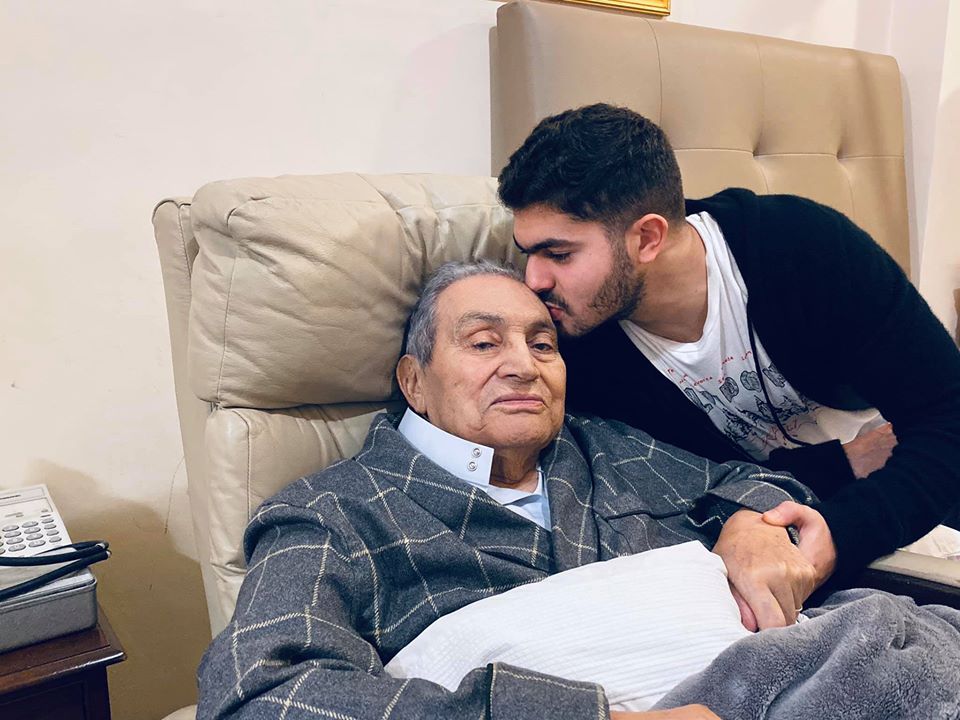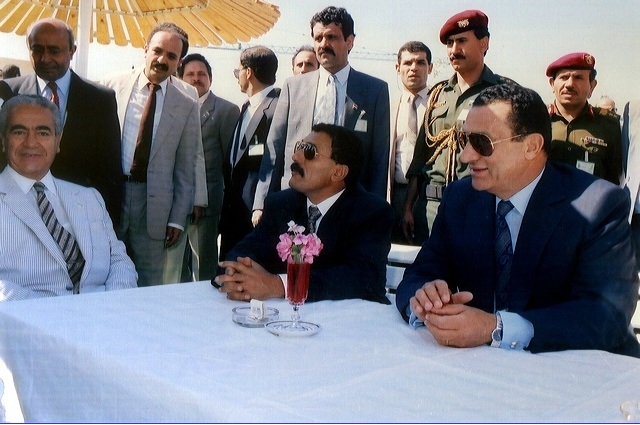Cairo, Egypt (Salama Mohamed Salama)
Former President Mohamed Hosni Mubarak died a short while ago, after suffering from a health illness recently. After three days of polarization about his death, between the exile and the emphasis on the pages of the Egyptian newspapers and TV screens. The Egyptian T.V announced in the morning of his death The military funeral will be performed tomorrow for the late President from the Mosque of Field Marshal Tantawi, the ministry of defense said today.
Mubarak had had surgery recently, but his son, Alaa, confirmed through his account on Twitter that he had left them in good health.
A source close to the former president of the “UKNEWSLINE” confirmed his death, after a debate in the past hours about the truth about the death. And News talked about Mubarak, we try to know from the sources, Ahmed Mosa the Anchor of sada el balad T.V channel announced last night that but he said too we search if that is prefect or not.
A few days ago, “Alaa” was asked his flowers on twitters to pray to his father after he was transferred to intensive care in a hospital. At that point, Alaa Mubarak revealed the health status of his father, explaining that he is still in care.
He replied to one of his followers on Twitter, who asked him about his father, saying: “He reassured about the health of the blessed one,” and Alaa answered him, saying: “He is still in care, Lord.”
In his statements yesterday, Sunday, the lawyer, Farid Al-Deeb, the lawyer of former President Hosni Mubarak, commented on his health, during a telephone conversation with the media by Mays Al-Hadidi through the “Cairo Now” program on Al-Arabiya satellite channel, saying: “Mubarak is fine and there is no truth to the rumors about his illness and his condition.” The psychological situation improved a lot after the ruling of the acquittal of his two sons, Gamal and Alaa, in the stock exchange case.
Al-Deeb indicated that former President Hosni Mubarak underwent surgery and is still undergoing intensive treatment in the hospital, and he did not leave, and under his health conditions and age, he is now still in intensive care for more care.
Al-Deeb denied in his intervention that the surgery performed by Mubarak was to remove a tumor in his stomach, saying: “There is no tumor and none of these details, and he did not enter into a coma and all these rumors … Thank God he is in good health and much improved and his condition is stable, and he will leave the hospital within days He pointed out that his last visit was several days ago.
A brief history about Mubarak.
Born in the Nile River delta, Mubarak graduated from the Egyptian military academy at Cairo (1949) and the air academy at Bilbays (1950), receiving advanced flight and bomber training in the Soviet Union. He held command positions in the Egyptian air force and from 1966 to 1969 was director of the air academy. In 1972 President Anwar el-Sadat appointed Mubarak chief commander of the air force, and in this capacity he was credited with the successful performance of the Egyptian air force in the opening days of the war with Israel in October 1973. He was promoted to the rank of air marshal in 1974. In April 1975 Sadat named him vice president, and in subsequent years Mubarak was active in most of the negotiations involving Middle Eastern and Arab policy. He served as the chief mediator in the dispute between Morocco, Algeria, and Mauritania over the future of Western (Spanish) Sahara.

Mubarak became president following Sadat’s assassination on October 6, 1981, the anniversary of the start of the 1973 Egyptian-Israeli war. His years in office were marked by an improvement in Egypt’s relations with the other Arab countries and by a cooling of relations with Israel, especially following the Israeli invasion of Lebanon in 1982. He reaffirmed Egypt’s peace treaty with Israel (1979) under the Camp David Accords, however, and cultivated good relations with the United States, which remained Egypt’s principal aid donor. In 1987 Mubarak was elected to a second six-year term as president. During the Persian Gulf crisis and war following Iraq’s invasion of Kuwait in 1990–91, Mubarak led other Arab states in supporting the Saudi decision to invite the aid of a U.S.-led military coalition to recover Kuwait. He also played an important role in mediating the bilateral agreement between Israel and the Palestine Liberation Organization that was signed in 1993.
Reelected president in 1993, Mubarak faced a rise in guerrilla violence and growing unrest among opposition parties, which pressed for democratic electoral reforms (the last free elections in Egypt had been held in 1950). He launched a campaign against Islamic fundamentalists, especially the Islamic Group, which was responsible for a 1997 attack at Luxor that left some 60 foreign tourists dead. In 1995 he escaped an assassination attempt in Ethiopia and in 1999 was slightly wounded after being attacked by a knife-wielding assailant. Throughout, Mubarak continued to press for peace in the Middle East. Running unopposed, he was reelected to a fourth term as president in 1999. In 2005 Mubarak easily won Egypt’s first multicandidate presidential election, which was marred by low voter turnout and allegations of irregularities.
In January 2011 thousands of protesters—angered by repression, corruption, and poverty in Egypt—took to the streets, calling for Mubarak to step down as president. Those demonstrations took place shortly after a popular uprising in Tunisia, known as the Jasmine Revolution, forced Tunisian President Zine al-Abidine Ben Ali from power. Mubarak made no public appearances until January 28—the fourth day of clashes between protesters and police—when he gave a speech on Egyptian state television indicating that he intended to remain in office. In the speech he acknowledged the protesters’ demand for political change by announcing that he would dissolve his cabinet and implement new social and economic reforms. Those concessions, however, were dismissed by protesters as a ploy to remain in power and did little to calm the unrest. The following day Mubarak appointed a vice president for the first time in his presidency, choosing Omar Suleiman, the director of the Egyptian General Intelligence Service. On February 1, under pressure from continued protests, Mubarak appeared on Egyptian state television and announced that he would not stand in the presidential election scheduled for September 2011.

